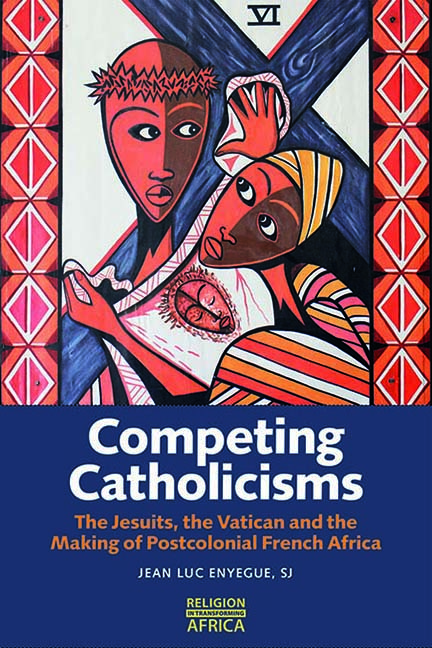Book contents
- Frontmatter
- Dedication
- Contents
- List of Illustrations
- Acknowledgements
- List of Abbreviations
- Glossary
- Chronology of Jesuit Missions in Chad and Cameroon
- Introduction: The End of the Jesuit Mission in Africa?
- Part I The Jesuit Project in West Africa: French Catholicism and Colonialism in Chad, 1935–58
- Part II The Outward Mission: Education and Competing Catholicisms
- Part III The Postcolonial Mission and Catholicity: From Chad to Cameroon, 1962–78
- Conclusion
- Bibliography
- Index
- Previously published titles in the series
8 - Era of Experimentation: M.-P. Hebga, First Cameroonian Major Superior, 1968–73
Published online by Cambridge University Press: 16 July 2022
- Frontmatter
- Dedication
- Contents
- List of Illustrations
- Acknowledgements
- List of Abbreviations
- Glossary
- Chronology of Jesuit Missions in Chad and Cameroon
- Introduction: The End of the Jesuit Mission in Africa?
- Part I The Jesuit Project in West Africa: French Catholicism and Colonialism in Chad, 1935–58
- Part II The Outward Mission: Education and Competing Catholicisms
- Part III The Postcolonial Mission and Catholicity: From Chad to Cameroon, 1962–78
- Conclusion
- Bibliography
- Index
- Previously published titles in the series
Summary
On 27 June 1968, Pedro Arrupe officially created the Region of Cameroon. He also appointed Hebga as regional superior. Informing Jacques Lesage, then provincial of Paris, Arrupe wrote:
Since the Fathers of our Society were called in 1957 to assist in the work of evangelization in Cameroon, many circumstances have changed: the country obtained its national independence, a local hierarchy was formed with Cameroonian Bishops, and our houses benefit from the presence of a certain number of trained Jesuits from Cameroon, resulting in a new context which calls for a new way of relating this territory to the Province of Paris […] I decide therefore to constitute the territory of Cameroon into a Region and place it under the authority of a Major Superior depending on the Provincial of Paris. I appoint to the post of Superior of the Region Fr Meinrad Hebga, Rector appointed of the Libermann High School of Douala. He will take charge next July 31st [1968].
The political emancipation and Africanisation of both the leadership of the Catholic Church in Cameroon and the membership of the Society were mentioned as factors that had influenced Arrupe's decision. Also significant was Arrupe's trust in Hebga's abilities. He had appointed Hebga to be the rector of Libermann. The difference between the date of Hebga's appointment and his inauguration was only a month. This was a sign of Arrupe's belief in Hebga's readiness for the job.
Concluding his letter, Arrupe blessed the new institution. He also determined the ultimate goal of the new Region, which alluded to Africanisation. He expected the Region ‘to produce abundant fruit for a deeper rooting of the Society in the traditions and culture of the country, and a greater number of recruitments of indigenous vocations’.
In this chapter, the creation of the Jesuit Region of Cameroon and the appointment of a Cameroonian as its superior represents a typical case of successful Africanisation, as envisioned by the Vatican and demanded by Africans themselves. Challenges faced by the new African leadership in Cameroon, however, also shine a light on the making of postcolonial Africa by establishing parallels between political and ecclesiastical Africanisation. African political leaders like Tombalbaye claimed leadership over their nations yet still remained dependent on France.
- Type
- Chapter
- Information
- Competing CatholicismsThe Jesuits, the Vatican and the Making of Postcolonial French Africa, pp. 194 - 225Publisher: Boydell & BrewerPrint publication year: 2022



